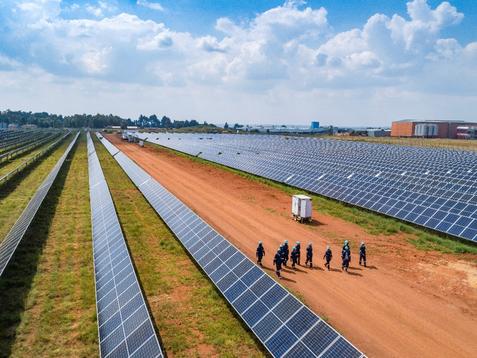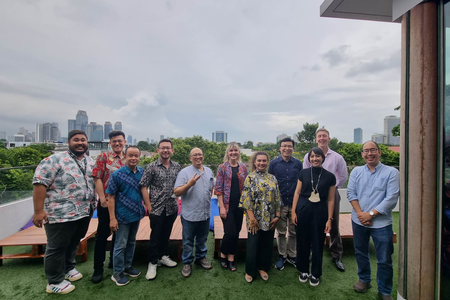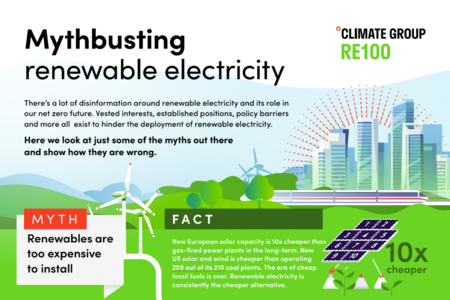Brewing beer can famously require a lot of energy, with much of it used in heating during the production process and then cooling for consumption.
Brewing this beverage that’s loved by billions around the world – energy intensive as it is – needs to become more sustainable. Thankfully, for brewers keen to go green, a 2018 study by Indiana University found that a majority of American beer drinkers were willing to pay more for beer that’s environmentally friendly.
Some of the world’s biggest and best-known brewers are members of RE100, and they’re an inspiring example of how we can drive the global transition to renewable electricity – as well as how to keep climate conscious beer drinkers happy. We sat down to speak with some of these breweries to learn more about their climate goals, their motivations, and the progress they have made since joining RE100.
What steps are breweries taking to improve their environmental impact?
RE100 members Asahi, Carlsberg Group, DAMM, and HEINEKEN, have all committed to using 100% renewable electricity by 2040 at the latest.
HEINEKEN’s approach is to first reduce emissions through energy efficiency, followed by replacing fossil fuel electricity sources with renewable ones. HEINEKEN has set its RE100 target for 2030, and has taken key steps towards achieving it, ensuring 58% of its total electricity use was renewable in 2022.
HEINEKEN is particularly proud of its new power purchase agreement (PPA) with a 14,000-panel solar farm just outside Johannesburg in South Africa, with a total capacity of 6.5 MW. HEINEKEN is the sole off-taker for the project, which successfully provides a stable energy supply in a market where renewables do not yet make up a large proportion of the energy mix.
For Asahi Europe & International, a prime example of its ambition and commitment to renewables is its progress in Poland – a country still heavily reliant on fossil fuels. Asahi has signed a 10-year contract to switch all of its Polish breweries to 100% renewable electricity, generated by wind farms in northern Poland.
Similarly, Carlsberg Denmark has signed a PPA to secure a decade of solar power through a farm the size of 105 football fields. In addition to contributing new green electricity to the grid, plus its other targets to reduce carbon emissions, Carlsberg is looking at its climate impact more holistically, with additional targets focused on agriculture, packaging and water.
Spanish brewer DAMM has implemented initiatives throughout its value chain to improve its environmental impact and to use fewer raw materials. As a result, DAMM became the first company in Spain to be certified EsAgua Platinum for sustainable water management, and the brewery prides itself on its 33,927 m² of solar panels.
What targets are breweries setting themselves?
DAMM achieved its RE100 target in 2022 and now produces 49% of its own electricity. DAMM aims to be net zero by 2040 and is focused on giving a second life to the natural resources it uses. For example, it has reduced water use at its production plants by up to 36% since 2008.
HEINEKEN’s broader ‘Brew a Better World’ ambition sets the goal of reaching net zero for Scope 1, 2, and 3 emissions by 2040. By 2030, HEINEKEN is targeting net zero for Scope 1 and 2 emissions, and a 30% emissions reduction across the entire HEINEKEN value chain.
Asahi Europe & International uses 100% renewable electricity in its breweries in the Netherlands and Poland, and are aiming for all electricity used in its breweries to come from renewable sources by 2025. Asahi is on track to be carbon neutral in all its European breweries by 2030 and it’s working with partners to reduce the carbon footprint of its supply chain by 30% by the same year.
Finally, Carlsberg’s ‘Together Towards ZERO and Beyond’ programme aims for ‘ZERO’ carbon emissions at its breweries by 2030 and for all renewable electricity from new assets by 2030. By 2040, Carlsberg wants to be net zero across its entire value chain. In 2022, 92% of the electricity used at Carlsberg’s global breweries was renewable.
With consumers increasingly expecting sustainability from beer brands, what are the biggest challenges breweries face in reaching their targets and meeting those expectations?
HEINEKEN operates in 70 countries, but can’t sign a PPA for wind or solar today in more than 20 of those countries. That’s because regulatory frameworks for PPAs don’t exist in these markets. HEINEKEN said that in many countries, there’s also an issue of supply – there’s simply not enough renewable electricity being permitted and transmission infrastructure being developed.
Carlsberg is proud of linking its sustainability to product traits that consumers have always cared about, such as high-quality yet convenient packaging. In 2020, DAMM became the first Spanish brewer to remove plastic from its packs of cans, eliminating almost 89 million plastic rings per year.
In Poland, Asahi Europe & International produces some of the nation’s favourite beers, including Żubr, Tyskie, and Lech. Asahi is keen to meet its customers’ climate expectations by using this example in Poland to inspire other businesses to use renewables.
What would help brewers achieve their individual RE100 targets?
For Carlsberg, a well-functioning, transparent, and efficient certificates market is a necessity for the successful trading of renewable electricity. HEINEKEN said that the average time to obtain permits to build renewable projects is two years – which it describes as simply too long. Through more enabling permitting environments for renewables, HEINEKEN said it will be better able to invest and add capacity to national grids.
DAMM believes that the support of policymakers is vital for reducing emissions – reduced emissions includes the transition to 100% renewable electricity, but also the electrification of transport fleets and the optimisation of the use of natural resources.
Through taking important climate steps, like those outlined above, RE100 member brewers are enabling more glasses, bottles and cans to contain environmentally friendly beer. Learn more about RE100 and find out how to join here.



